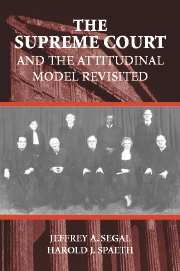Book contents
- Frontmatter
- Contents
- List of Illustrations
- List of Tables
- Preface
- 1 Introduction: Supreme Court Policy Making
- 2 Models of Decision Making: The Legal Model
- 3 Models of Decision Making: The Attitudinal and Rational Choice Models
- 4 A Political History of the Supreme Court
- 5 Staffing the Court
- 6 Getting into Court
- 7 The Decision on the Merits: The Legal Model
- 8 The Decision on the Merits: The Attitudinal and Rational Choice Models
- 9 Opinion Assignment and Opinion Coalitions
- 10 The Supreme Court and Constitutional Democracy
- 11 Conclusion
- Case Index
- General Index
5 - Staffing the Court
Published online by Cambridge University Press: 05 June 2012
- Frontmatter
- Contents
- List of Illustrations
- List of Tables
- Preface
- 1 Introduction: Supreme Court Policy Making
- 2 Models of Decision Making: The Legal Model
- 3 Models of Decision Making: The Attitudinal and Rational Choice Models
- 4 A Political History of the Supreme Court
- 5 Staffing the Court
- 6 Getting into Court
- 7 The Decision on the Merits: The Legal Model
- 8 The Decision on the Merits: The Attitudinal and Rational Choice Models
- 9 Opinion Assignment and Opinion Coalitions
- 10 The Supreme Court and Constitutional Democracy
- 11 Conclusion
- Case Index
- General Index
Summary
On July 1, 1987, President Ronald Reagan nominated Robert Bork, U.S. Circuit Court Judge for the District of Columbia, to the Supreme Court. Bork, former professor at Yale Law School and erstwhile Solicitor General of the United States, had been confirmed to what is reputedly the nation's second most prestigious court by a unanimous vote of the Senate. In November 1986, Senate Judiciary Committee Chairman Joseph Biden (D-Del.) told the Philadelphia Inquirer that if a wellqualified conservative like Bork were nominated for the Supreme Court, “I'll have to vote for him, and if the groups tear me apart, that's the medicine I'll have to take.” Yet eleven months later Biden's Judiciary Committee followed his lead and voted 9 to 5 against Bork. Less than three weeks after that, the full Senate concurred, 58 to 42. History will undoubtedly regard the rejection of the radical-rightist Bork as the biggest legislative failure of the Reagan administration.
To the extent that the legal model requires justices to find the “correct” answer to legal questions, it should not matter much whom the President nominates or whether the Senate confirms, given a requisite modicum of legal training and intelligence. Differences might result, say, from followers of intent versus followers of text, but there would be overwhelming agreement on the basic principles of government. However, if the Court largely bases its decisions on the attitudes and values of the justices, then clearly “the most important appointments a President makes are those to the Supreme Court of the United States.”
- Type
- Chapter
- Information
- The Supreme Court and the Attitudinal Model Revisited , pp. 178 - 222Publisher: Cambridge University PressPrint publication year: 2002
- 1
- Cited by



